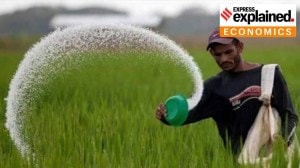In Mauritius,an undercurrent: Hindu vs non-Hindu
Just before President Pratibha Patils four-day visit to Mauritius,an older accusation against the Navinchandra Ramgoolam government had gained new currency.
Just before President Pratibha Patils four-day visit to Mauritius,an older accusation against the Navinchandra Ramgoolam government had gained new currency. At the centre of the controversy is the Neo Town mega project,inaugurated last year in Port Louis. Opposition parties of this tiny island nation have charged the government with signing off prime property of about 60 acres next to the waterfront in the capital city,ostensibly for development of high rises,malls etc,to an Indian company,Mumbai-based Patel Engineering,for a song.
But because of the presidential visit,we decided not to talk about it for a while,out of respect for the Indian President, says Vijay Makhan,a prominent leader in the main Opposition party,the Mouvement Militant Mauricien (MMM) and formerly foreign secretary in the Mauritius government.
There was more to the MMMs backing down than just the politically correct desire to defer the washing of dirty linen till after the distinguished visitor has gone back home. When we raise questions in such a deal (in which an Indian player is involved),we are accused of India-bashing, says Makhan.
India-bashing is a charge the MMM cannot ignore and one it is especially vulnerable to,says Makhan,simply because it is led by Paul Berenger,who belongs to the Franco-Mauritian community. The government,on the other hand,is led by an alliance that has at its centre the Mauritius Labour Party,seen to represent the islands majority Hindu community of Indian origin. In other words,the MMM is wary of a government-opposition confrontation over alleged corruption taking on a predictable ethnic dimension Hindu vs non-Hindu.
Forty-three years after Independence, says Makhan,who is himself of Indian origin,there is no Mauritian in Mauritius. There are persons of Indian stock and of Chinese or African ancestry.
It is a lament that resonates with varying degrees of urgency in this picture-perfect country that has been described as Little India and is routinely hailed by others,including President Pratibha Patil,as a model of social harmony. In her statements and speeches here so far,Patil has repeatedly touched upon the bonds of affinity and kinship between the two countries,not only because the shores of our two countries are washed by the waters of the same Ocean but also because of the presence of a large number of people of Indian origin and our shared and abiding commitment to the ideals of democracy and pluralism.
For such a tiny country,Mauritius is an incredibly complex socio-political mosaic. There were no original inhabitants of Mauritius,everyone came from outside. Two hundred years ago,the Indians,for instance,were brought in ships as indentured labour to work in the islands lush sugarcane plantations.
According to latest census figures,persons of Indian origin,excluding the Muslims,constitute about 50 per cent of the population; Muslims,counted as a separate ethnic group,are about 19 per cent; persons of African descent or Creoles about 26 per cent; Franco Mauritians and other Euro-Mauritians make up about two cent while persons of Chinese descent account for the rest.
The numerically dominant community of Indian descent has enjoyed a virtual monopoly over political power though economically the small minority of Franco-Mauritians are seen to be powerful. Since its independence more than four decades ago,all Mauritian prime ministers,except one,have been Hindus belonging to the Vaish caste; even more specifically,power has alternated between two families,the Ramgoolams and the Jugnauths.
For many,ethnic differences are always-already an undercurrent,an obstacle to the formation of a larger Mauritian identity. Politicians like Makhan admit that Weve been working hard to build a Mauritian identity,but others are more blunt.
Mauritius has two faces, says Mohamad Vayid,former chairman of the National Economic and Social Council. One is the face it presents to the world,of immaculate beaches and a peaceful population living in harmony. The other face of Mauritius is of a country in which anyone who is not a Hindu is a second-class citizen. For Roukaya Kasenally,who teaches media and political systems at the University of Mauritius,More than four decades later,Mauritian identity is an empty vessel.
While other small countries like Singapore,Hong Kong and Dubai could forge a national identity,says Kasenally,Mauritius remains caught in a culture of dependency. We are unable to define Mauritius-ness. We are desperate to link it up with Indian-ness,African-ness and Chinese-ness.


- 01
- 02
- 03
- 04
- 05




























